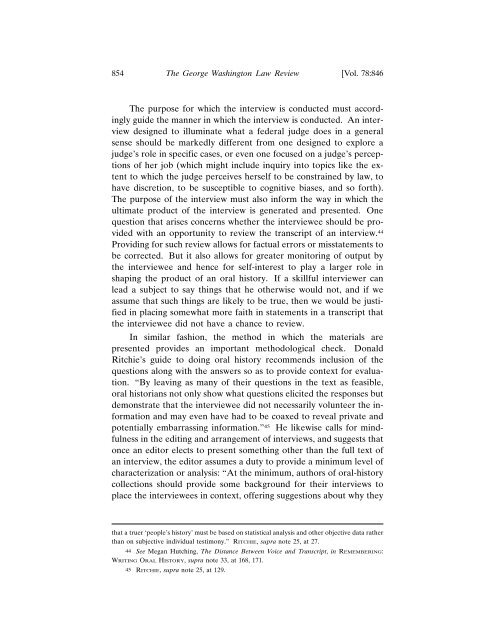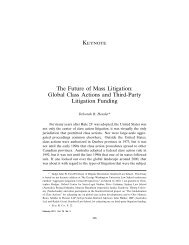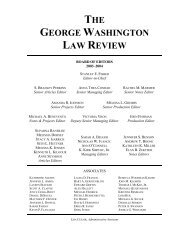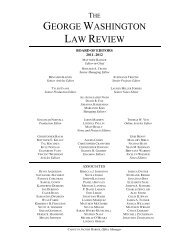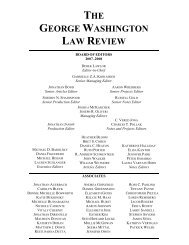View PDF - The George Washington Law Review
View PDF - The George Washington Law Review
View PDF - The George Washington Law Review
You also want an ePaper? Increase the reach of your titles
YUMPU automatically turns print PDFs into web optimized ePapers that Google loves.
854 <strong>The</strong> <strong>George</strong> <strong>Washington</strong> <strong>Law</strong> <strong>Review</strong> [Vol. 78:846<br />
<strong>The</strong> purpose for which the interview is conducted must accordingly<br />
guide the manner in which the interview is conducted. An interview<br />
designed to illuminate what a federal judge does in a general<br />
sense should be markedly different from one designed to explore a<br />
judge’s role in specific cases, or even one focused on a judge’s perceptions<br />
of her job (which might include inquiry into topics like the extent<br />
to which the judge perceives herself to be constrained by law, to<br />
have discretion, to be susceptible to cognitive biases, and so forth).<br />
<strong>The</strong> purpose of the interview must also inform the way in which the<br />
ultimate product of the interview is generated and presented. One<br />
question that arises concerns whether the interviewee should be provided<br />
with an opportunity to review the transcript of an interview. 44<br />
Providing for such review allows for factual errors or misstatements to<br />
be corrected. But it also allows for greater monitoring of output by<br />
the interviewee and hence for self-interest to play a larger role in<br />
shaping the product of an oral history. If a skillful interviewer can<br />
lead a subject to say things that he otherwise would not, and if we<br />
assume that such things are likely to be true, then we would be justified<br />
in placing somewhat more faith in statements in a transcript that<br />
the interviewee did not have a chance to review.<br />
In similar fashion, the method in which the materials are<br />
presented provides an important methodological check. Donald<br />
Ritchie’s guide to doing oral history recommends inclusion of the<br />
questions along with the answers so as to provide context for evaluation.<br />
“By leaving as many of their questions in the text as feasible,<br />
oral historians not only show what questions elicited the responses but<br />
demonstrate that the interviewee did not necessarily volunteer the information<br />
and may even have had to be coaxed to reveal private and<br />
potentially embarrassing information.” 45 He likewise calls for mindfulness<br />
in the editing and arrangement of interviews, and suggests that<br />
once an editor elects to present something other than the full text of<br />
an interview, the editor assumes a duty to provide a minimum level of<br />
characterization or analysis: “At the minimum, authors of oral-history<br />
collections should provide some background for their interviews to<br />
place the interviewees in context, offering suggestions about why they<br />
that a truer ‘people’s history’ must be based on statistical analysis and other objective data rather<br />
than on subjective individual testimony.” RITCHIE, supra note 25, at 27.<br />
44 See Megan Hutching, <strong>The</strong> Distance Between Voice and Transcript, in REMEMBERING:<br />
WRITING ORAL HISTORY, supra note 33, at 168, 171.<br />
45 RITCHIE, supra note 25, at 129.


